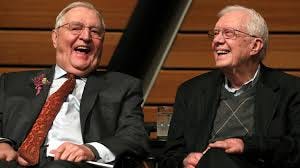There’s a lot lot lot going on in the world right now. And most of it feels pretty bad. I’ll write on it (including my way overdue post on Vance in Munich and his treatment of Zelensky in the Oval Office.) But for this Throwback Thursday, I’m going in a different direction. Oddly, the original post below starts the same way—there’s big bad stuff in the world, but let’s talk about funny VPs.
Veeps becoming national jokes is a well-established phenomenon. I have an appendix in my dissertation devoted to them. For much of U.S. history, the most famous VP was the fictional Throttlebottom from the musical Of Thee I Sing, more recently we have Veep. The only way Throttlebottom could get into the White House was buying a ticket and going on the White House tour. It’s a weird office, one that turns a bona fide war hero into a “wimp.” Now that we’re in the 21st century, it isn’t just jokes, JD Vance is being memefied!
From Thomas Marshall to Joe Biden (and maybe to JD Vance—I can’t quite tell) many of our VPs have been pretty funny and recent ones have used it to build a relationship with the President. Chase Untermeyer wrote that Congressional experience should be a must for a VP, but maybe so should a sense of humor.
Also, quick update on the continuing VP drama in the Philippines, the VP’s father, former President Rodrigo Duterte was just arrested and sent to The Hague under charges from the International Criminal Court. Philippines politics is very much an ongoing series of family feuds, and the clan of President Marcos seems dedicated to destroying the Duterte clan. We’ll keep tracking this one.
This post was originally published on March 14, 2014.
I suppose I should be writing about Ukraine or Syria—big things are happening in the world. But my mind is elsewhere. I found an intriguing new datapoint for my dissertation. Influential vice presidents are funny, and can make the president laugh.
Mondale is funny, it did not translate into a broader appeal, but people who worked with him always remarked on his quick and ready wit, which he happily turned on himself. When asked how he thought one of his speeches went he answered, “I don’t know, I fell asleep halfway through.” After losing the 1984 Presidential election he said, “All my life I wanted to run for the Presidency in the worst way. And that’s just what I did.”
He is also a big Monty Python fan.
George H.W. Bush, according to people I interviewed, loved a good joke. They used to circulate funny memos around the office (at their lunches, Reagan and Bush told each other jokes.) As President, when he learned that Saddam Hussein intended to try him in a “people’s court” he sent a memo to White House Counsel C. Boyden Gray instructing him to go to Baghdad an defend him. At the height of a crisis he had time for a little fun with his advisors.
Gore, by many accounts was really, really funny. My interviews have mentioned it, as did several White House memoirs. George Stephanopoulos reports that Gore could always make the President laugh, delivering daily briefings on the John Wayne-Lorena Bobbit affair, and poking fun at Clinton when he was frustrated prepping for press conferences.
I don’t know about Quayle, but there is substantial evidence that Cheney had a good sense of humor. In his memoirs, Bush mentioned Cheney’s dry wit. A few weeks before leaving office, there was a conference of White House chiefs of staff to meet the incoming chief of staff—Rahm Emmanuel. Cheney had been Ford’s chief of staff. Each one offered their advice to Emmanuel. Cheney suggested, “Whatever you do, make sure you’ve got the vice president under control.”
The vice president has long been the target of humor, but this is different. I don’t have many datapoints here (but my whole research project is pretty small-n). But, the ability to make the President laugh, particularly at himself, is a real asset. Both in building the needed chemistry between the POTUS and the Veep, but also in managing the inevitable and massive stresses of the top office.
Too bad Spiro Agnew couldn’t make Nixon laugh—they both could have used it. And ultra-serious Henry A. Wallace almost certainly would have been well-served by a good sense of humor in dealing with the breezy, witty Roosevelt.




